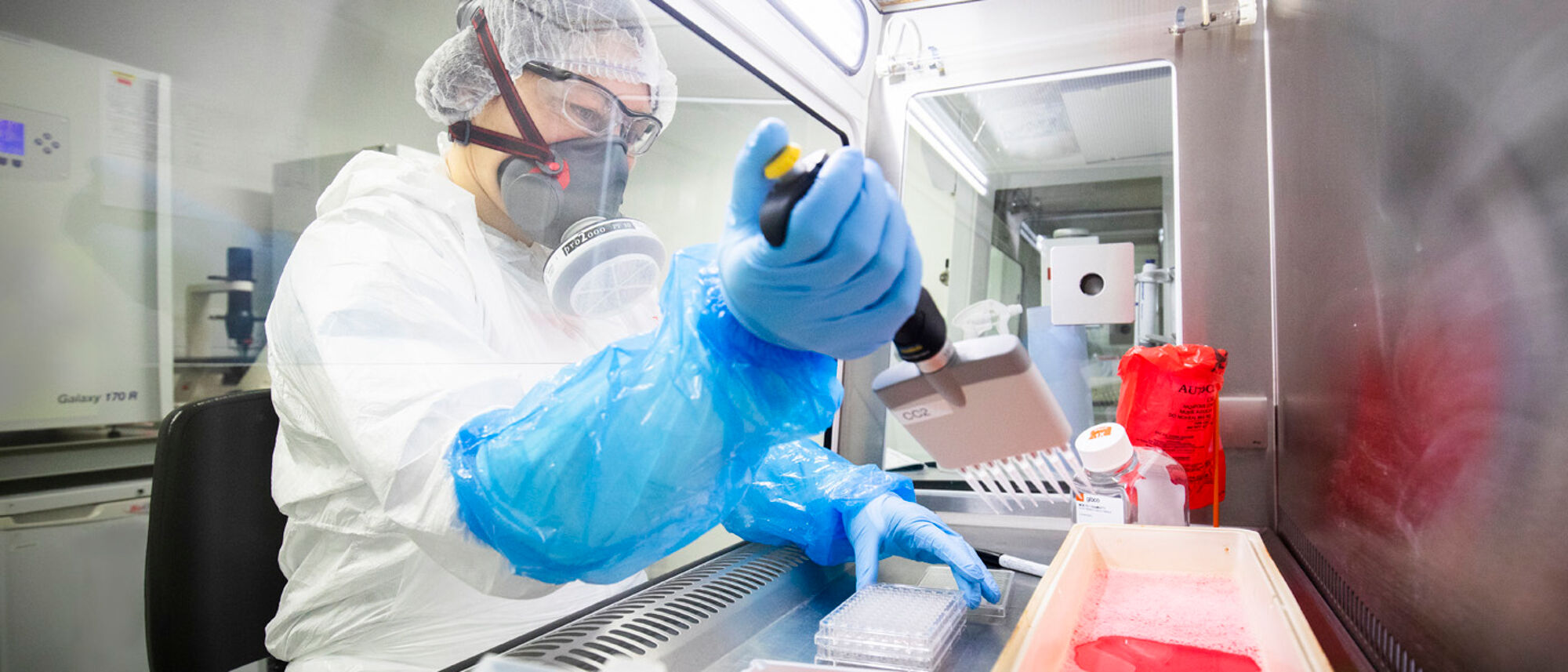
On the front line against COVID
By Ali Howard and Elizabeth McMeekin
As the world woke up to the threat of a new virus in early 2020, UofG's renowned Centre for Virus Research (CVR) made a radical and abrupt pivot to focus its research efforts on meeting the challenge. The CVR played a crucial role in the UK's response to the COVID-19 pandemic, and its advanced virology capability led to the award of a prestigious Queen's Anniversary Prize in 2021.
In January 2020, as reports of a novel coronavirus originating in Wuhan, China, were circulating around the world, the CVR's Dr Antonia Ho and Professor David L Robertson were preparing to publish some of the first analysis of the new virus. Until then, Dr Ho’s primary research focus had been the clinical epidemiology of influenza and other respiratory viral infections in the UK and sub-Saharan Africa. “In early 2020," she says, "my focus quickly shifted to SARS-CoV-2, and I started working together with other academic institutions and alongside the NHS, sharing resources and data."
While many of us were still largely oblivious as to how drastically life was about to change, the CVR was rapidly redirecting all its efforts, working seven days a week, to focus on the new coronavirus. CVR scientists were among a select group on the front foot of the biggest global health event in generations, and their expertise catapulted them into the media spotlight around the world.
“As the largest group of virologists in the UK with the facilities to handle samples from infected patients, the CVR was always best placed to react quickly and conduct pivotal research into COVID-19,” says Professor Massimo Palmarini, Director of the CVR. “As a centre, we are an incredibly united and dedicated team, and it was necessary we switched our focus immediately.”

Cells infected with SARS-CoV-2 being examined under a microscope at UofG's Richard Elliott Biosafety Laboratories.
By early March 2020, the CVR had positioned itself at the forefront of Scotland’s and the UK’s COVID-19 response:
- key staff were members of UK Task Forces and consortiums set up to tackle the pandemic
- studies were deployed at speed with partners across the UK and the world to quickly address fundamental questions about the nature of the virus
- genomic sequencing of Scottish cases began immediately, feeding into the UK’s national genome sequencing consortium, COG-UK. Technical and laboratory staff, in particular, were instrumental in the CVR’s pivot to studying the new human virus.
"The CVR's size, breadth and depth of multidisciplinary expertise, and state-of-the-art facilities, enable its researchers to address the challenges of known and novel viruses at a scale not easily replicated." Queen's Anniversary Prize testimonial
The CVR’s genomic sequencing of the virus, led by Dr Ana Filipe, the head of CVR Genomics, included the first COVID-19 patient confirmed in Scotland, enabling researchers to extract key genetic information linking the origins of the infection with a known case in Italy. The subsequent study published, which showed that the virus was introduced into Scotland at least 300 times in the first month of the outbreak, was led by Professor of Infectious Diseases Emma Thomson, along with collaborators in Public Health Scotland, NHS Scotland and the University of Edinburgh.
"We knew we needed to respond rapidly to the outbreak," says Professor Thomson who, prior to the COVID-19 pandemic, had been ‘hunting’ for new viruses in Uganda. "This is why the CVR took the decision to prioritise efforts to sequence and better understand this virus.”

CVR researcher Dr Wilhelm Furnon looking at the effect SARS-CoV-2 has on cells.
The impact made by the CVR in the last two years has been significant and includes:
- world-leading studies on the origins of SARS-CoV-2, led by Professor David Robertson and colleagues
- the opening of a £2.5m COVID-19 drug screening hub to discover potential new treatments
- a virus ‘toolkit’ to share information with the scientific community
- seminal studies on how our innate immunity fights the virus, led by Professor Sam Wilson
- Dr Antonia Ho’s role as partner in the International Severe Acute Respiratory and Emerging Infection Consortium.
Professor Palmarini believes COVID-19 will continue to be researched into the future. “Our international reputation put us at the forefront of COVID-19 efforts," he says, "and while SARS-CoV-2 will remain a focus for some time yet, our research will continue to encompass advancing understanding of a wide range of viruses, how they emerge and move from animals to humans, and how they enter and spread through communities and cause disease.”
This article was first published March 2022.
Images top and left: Jane Barlow PA
A prize institution
The Queen’s Anniversary Prize (QAP) was awarded to the University in November 2021 for the CVR’s advanced virology research to combat diseases such as hepatitis C and dengue. The CVR has earned an international reputation for its innovative approach to tackling viruses and it was this embedded expertise which paved the way for its unprecedented COVID-19 response.
The prestigious prizes recognise outstanding work by UK colleges and universities that deliver tangible benefits to the world, and the CVR's award was the fifth QAP won by the University.
Most recently, we were awarded a QAP in 2017 for our acclaimed and unique Historical Thesaurus of English, a five-decade-long effort to chart the evolution of the English language over the last 1,000 years.

